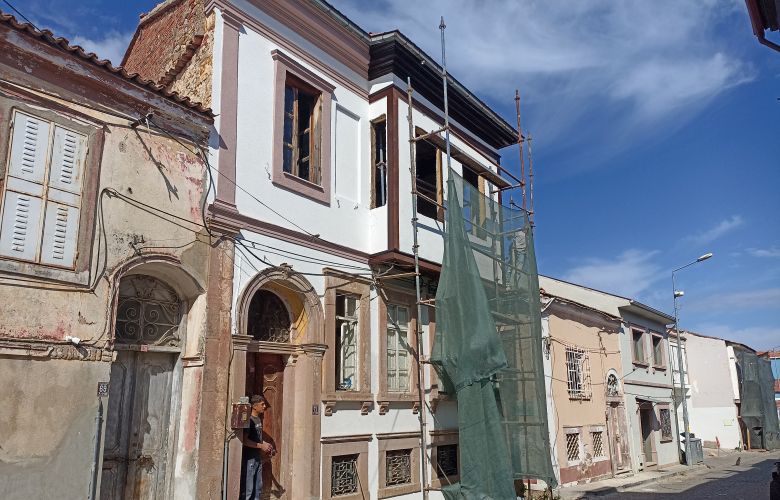He was born there and lived there until he was 18 years old
One month after the revealing publication of APE-MBE, with which it became known that the house in Asia Minor Ayvali, in the historical Kydonias, where he was born and lived for many years and until he was 18, is collapsing day by day, the great Greek stylist Ilias Venezis, restoration work on the monument began.
Pressured by the constant reports in the Greek and Turkish press as well as by the local community and its agencies, the private owner of the house started restoration work, which, at least from the outside, has progressed significantly. Already, the roof of the emblematic house for Asia Minor Hellenism, and the facades of the light (Baghdati) plastered wooden frame of the upper floor, which is based on the stone ground floor, have been restored.
It should be noted that the private owner of the property refused to make the slightest statement about the use of the property. However, information indicates that there is clear interest from the Municipality of Ayvali.
The house of Michael Mellos, the author’s father, who is from Kefalonia, and his mother, who is of lesbian origin, (his maternal grandfather Dimitrios was called Venezis, whose name he used as a literary pseudonym) is located in the upper wide alley of Ayvali. Very close to the Church of the Holy Trinity which is also collapsing.
In it, what the author tragically describes in his historical book “The Number 31328” took place. Events concerning the end of Asia Minor Hellenism in the Aivalio State in September 1922, his arrest and his life in the Labor Orders for 14 months until his release together with the few survivors of his fellow countrymen’s hardships.
THE Ilias Venezis when he was arrested he was only 18 years old. Born in Ayvali in 1904, he spent with his family in Mytilini during the years of the first world war and the so-called first persecution. They returned to their state in 1919 and graduated from the historic Kydonia High School, successor to the great Kydonia Academy! After his release from the Labor Orders in the fall of 1923 in accordance with the terms agreed with the Treaty of Lausanne, he returned to Mytilini. There, he connected with the literary company of Stratis Myrivilis who motivated him to record what he experienced in his captivity. This is how “The Number 31328” was born, which was published for the first time in sequels in the “Kampana” newspaper of Mytilini, in which Mirivilis was the director. It should be noted that Venezis and Mirivilis (student and teacher that is) shared the first ever State Prize for Prose. Both were candidates in 1956 for the Chair of Literature at the Academy of Athens, to which Venezis was elected.
“Number 31328” was followed by the novels “Galini” and “Aeolian Land”, also emblematic for the history of Asia Minor Hellenism. It should be noted that Venezis was persecuted for his political ideas during the Metaxas dictatorship, while during the Occupation he was arrested on the charge that, on the occasion of the anniversary of October 28, he had spoken at a gathering of the staff of the Bank of Greece where he worked. He was imprisoned in “Block C” which was the occasion to write his only play of the same name. His execution was prevented at the last minute after backlash from the spiritual world.
With a rich literary work, this Greek writer from Asia Minor was twice nominated for the Nobel Prize for literature, in 1960 and 1963.
He died in 1973 and by his order he was buried in the cemetery of Molyvos (Mithymna) in northern Lesbos, opposite his hometown in an anonymous grave on which he himself chose to have only the word “GALINE” written.
The house of Venezis, unknown to many, has been identified since 1970. Then Venezis’s sister Agapi Molyviatis and her son, a young diplomat at the time, Petros Molyviatis, visited Ayvali. In fact, they were photographed outside the house.
This photo was published in November 1972 in the magazine “Aeolika Grammata” and in 1974 in “Nea Estia”. It ended up in the hands of Dimitros Psarrou, the author of the monumental work “THE AIVALI” in whose archive it will probably be found. A copy of this photograph was given to the undersigned a few years ago by Anna Venezis, daughter of Ilias Venezis when she had visited Mytilene.








